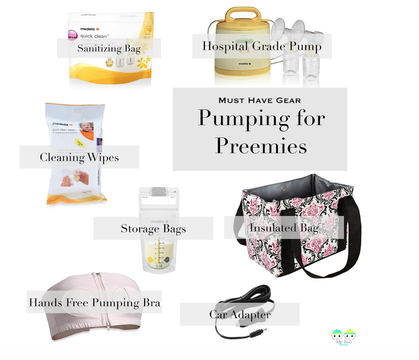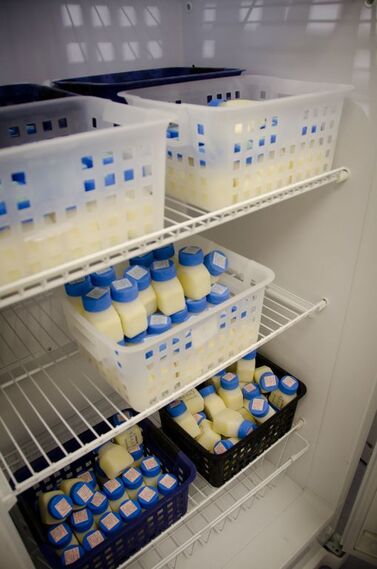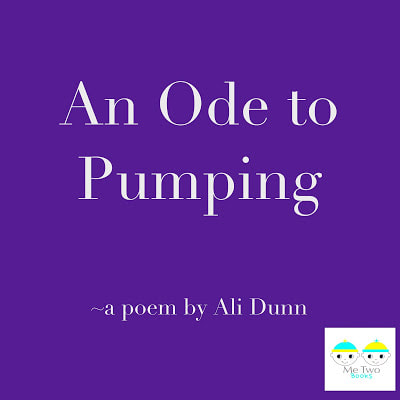|
Regardless of how you ultimately choose to feed your baby, if your baby is born early you will probably be encouraged to start pumping breast milk right away. Preemies need more calories and nutrients to help them grow quickly. In addition to providing nourishment, breast milk can also help reduce the risk of NEC, build immunity, and prevent infection. Few preemies are able to feed from the breast or a bottle right away. Therefore, expressing your breast milk and providing it to the NICU in both it’s fresh and frozen form is an important part of your child’s medical care. But, it is not easy. Pumping is a labor of love and requires a great deal of commitment and time. I am not a medical expert, but I did pump exclusively for my preemie twins for 15 months. Here are a few of my tips and favorite products to help make things easier.
Start pumping as soon as possible after your baby’s birth When I arrived in my hospital room post c-section, there was a breast pump and a lactation consultant waiting for me. I started pumping right away. It took several days for my milk to come in, but pumping early and often was vital for establishing supply. Every single drop was taken to my babies in the NICU. Establish and maintain a pumping schedule In the beginning, you will need to pump at least every 2-3 hours around the clock. It is hard to set an alarm and wake up in the middle of the night to pump, but a schedule that mimics the newborn feeding pattern will help to maintain and grow your supply with your preemie. As your baby grows and needs to eat less frequently, your pumping frequency will change as well. Find support A lactation consultant and your baby’s medical care team are great resources. They can provide you with any specific guidelines you need to follow when expressing and storing your breast milk. Also, make sure to discuss with them how you intend to feed your baby post hospital, so they can prepare and support you in that decision. Lactation consultants are not only available during a hospital stay, you can contact them at any time. They can also help you to identify the signs and symptoms of plugged milk ducts and mastitis, both of which are quite painful and can hurt your supply. Accept the difficulty I have said it before, but it bears repeating. Pumping is hard! It can certainly feel like all you have time to do in a day is eat and pump. And there may be times during this journey when that is true! But if pumping for your baby is what you want or need to do, it can be rewarding and successful. Pumping Products Hands-free Pumping Bra- If you are going to be spending any amount of time pumping breast milk for your preemie, a hands-free pumping bra is a must. Every Momma can benefit from multitasking while pumping. Hospital Grade Pump- A powerful breast pump and a lactation consultant will set you on the road to success. And remember, you don’t need to buy a hospital grade pump. You can rent a pump for a monthly fee, which may be covered by health insurance. Car Adapter- At some point, you will want to leave the house. Being able to pump on the go can provide you with some much-deserved freedom. Insulated Bag- An insulated cooler bag is necessary for transporting pumped and frozen milk to and from the hospital. Breastmilk Storage Bags- Most hospitals will provide specific storage containers for breast milk while your baby is admitted. But once home, you will need something to keep milk in until you are ready to use it. Some women prefer a storage bag because they take up less space and are less expensive than storing in a bottle. Remember to label for future reference. Convenient Pump Cleaning- Keeping your pump parts clean is important especially when you are pumping for a preemie. If you are making trips back and forth to the NICU, you might not always have access to soap and water. Cleaning wipes formulated especially to clean pump parts are great in a pinch. Sterilization bags that go right in the microwave and are quick and easy to use. *this is not an endorsement of any product, just what worked for me This post was originally published by HandtoHold.org in Aug. 2018. I am all for breastfeeding. I am amazed by the life-saving power of breast milk, that I have witnessed first hand. I know that breast milk is both nutrition and medicine especially for the tiniest of babies. I understand why it is referred to as liquid gold. And yet somehow this description falls short when you are agonizing over every single ounce. So you would probably assume that I breastfed my twins…well not exactly. I fell into a gray area when it came to breastfeeding, I was an exclusive pumper. Perhaps it was my own insecurity, but I never felt like I should say I breastfed without a long clarifying statement. My twins were born at 28 weeks. Much too small and fragile to eat by mouth, let alone to latch and suck. So like many preemie mommas, I started pumping. I wasn’t sure that I would be able to produce any milk after such a traumatic and early birth, but I had to try. The NICU staff that were caring for my twins stressed the importance of every drop. They said my preemies needed more calories and nutrients to help them grow quickly. Breast milk was one of the best ways to help reduce the risk of NEC, build immunity, and prevent infection. After a day or two, it finally started to work. It went from, “I think there might be something in the bottle,” to a full ounce, then two. Those sweet nurses cheered over any amount of milk I was able to express, which was promptly walked down the hall to the NICU. Soon the day came when I was ready to leave the hospital, but my babies were not. It is a heart-wrenching experience to leave the hospital no longer pregnant, but without a baby. I had to rely on the nurses to tell me how my babies were doing, to show me how to care for them, and to give me permission to hold them. But the one thing that only I could provide was breast milk. I felt like I couldn’t do much for my babies while they were in the NICU, but I could pump. So that’s what I did. Each morning I drove to the NICU with a cooler packed full of milk. It certainly wasn’t easy. I was setting alarms and waking up multiple times a night to pump for 30 minutes and fill those tiny hospital-supplied bottles with milk. I bought another freezer to store all the bottles until they were needed at the hospital. I thought I would continue to pump until they were released from the hospital. And two months later when they were, I didn’t quit. When one of my twins was diagnosed with an intolerance to dairy, I was advised to cut all the common food allergens from my diet if I was going to continue to feed them breast milk. I drastically changed my diet and eliminated dairy, tree nuts, soy, and shellfish. For 15 months, pumping for my twins was a huge part of my life. I pumped inside, I pumped outside. I pumped in the car, while washing bottles, and while feeding babies. I pumped with clogged milk ducts. I even was able to pump while sleeping. Pumping was important to me; it made me feel like a mother. When I had very little to give my preemies in the NICU, pumping for them gave me a sense of purpose. When I had very little control over their care and their health, I felt empowered by my ability to provide something they needed. When I felt like my body had failed in growing my babies to term, I felt it redeemed itself by producing a perfect food for them. So even though it was hard and time-consuming, I never gave up. Did I breastfeed my twins? Well not in its purest form. What ended up being true for us was not the picture of a mother with her child at her breast. It was a compromise. The process was vastly different, but the end results essentially the same. So this month as we celebrate breastfeeding and raise awareness of its benefits, remember the exclusive pumpers. We want to be seen. We want to join in on the stories and perspectives of nourishing our children. And we want to share our stories, just as soon as we find an outlet to plug in our breast pumps! How a Mama chooses to feed her baby is often a polarizing topic. But this is a judgment-free zone. And because August is Breastfeeding Awareness Month, I would like to share my experience with exclusive pumping. I hope it makes you giggle and you can appreciate another perspective on breastfeeding.
|




 RSS Feed
RSS Feed